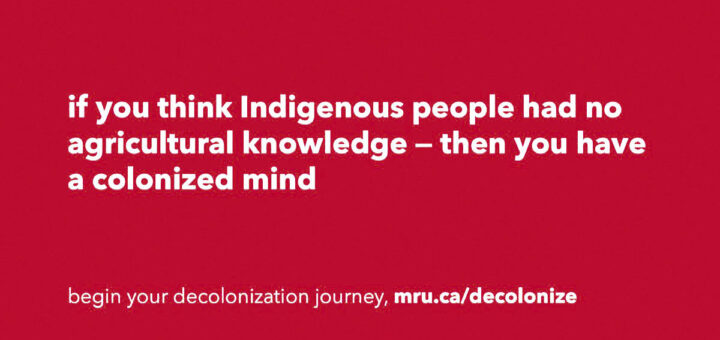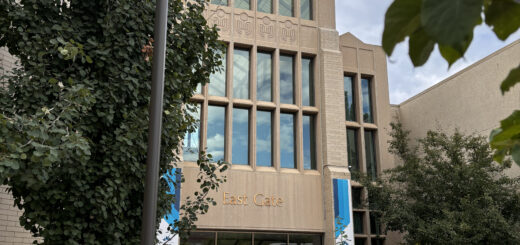Posters shed light on anti-Indigenous ideas as MRU VP receives death threats

By Noel Harper, Staff Writer
Students may have seen them while walking through the Mount Royal University (MRU) campus recently — simple posters with a significant message behind them, causing passers-by to stop and reflect. Each poster features an incorrect or misinformed idea about Indigenous peoples and what these ideas mean.
One poster states, if someone, “think Aboriginal people get everything for free,” or that they “have the same opportunities as other Canadians,” then “you have a colonized mind.”
The posters invite members of the Mount Royal community to “begin [their] decolonization journey,” promoting a website containing academic resources, news articles and upcoming events to do with Indigenous perspectives, history and struggles. It serves to demystify and correct the perspectives shown on the posters.
The campaign arrives in the wake of a CBC report on linda manyguns (whose name is stylized in lower-case letters as part of a movement to “reject the symbols of hierarchy”), Mount Royal’s associate vice-president of Indigenization and decolonization.
manyguns, who has only been with the university since April, revealed how her personal safety had been threatened as a result of the aforementioned movement.
Since publicly discussing how the practice of using only lowercase letters demonstrates solidarity with Indigenous peoples, known as “eventing,” manyguns has had to take precautions at her office after receiving thousands of hateful and threatening messages.
“I had anticipated having to argue my position. I was ready to do that,” manyguns told CBC. “I had no idea that my life would be threatened.”
Campus security often sweeps manyguns’ office, the location of which is being kept under wraps, and the Calgary Police hate crimes unit is investigating the barrage of messages sent to her.
After the article was published, several members of the Mount Royal faculty came to manyguns’ defense. MRU professor Erika Smith tweeted “I am outraged and incredibly saddened at this racism. This hateful behaviour has no place in academia or our society.”
manyguns mentioned working on the colonization campaign at the time, which is now in full effect and will be coming to other Alberta post-secondary institutions in the future.
Sept. 30 marked the first National Day for Truth and Reconciliation as a federal statutory holiday. Demystifying statements about Indigenous history and culture were also on display throughout campus in the days and weeks that surrounded the holiday.
These included the facts that Indigenous peoples in North America began mining long before any other groups arrived, a global recession was birthed from colonial resource theft in the 1500s, as well as what produce was a result of Indigenous agriculture.
Mount Royal’s “Knowledge Sharing” collection aims to continue the conversation about decolonization beyond Sept. 30. In part, it showcases upcoming dates that are significant to Indigenous peoples and corresponding events on campus.
Nov. 8, for instance, marked National Indigenous Veterans’ Day, which, since 1994, has recognized the Indigenous contributions to major military conflicts. The following week, from Nov. 15 to 21, is Métis Week.
Starting in November, students are also welcome to join the Decolonizing Our Minds Book Club, presented by the Traditional Paths Society. The club “will explore the philosophy that reconciliation cannot happen without or before decolonization.”




